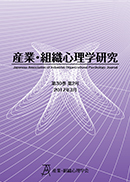Volume 30, Issue 1
Displaying 1-8 of 8 articles from this issue
- |<
- <
- 1
- >
- >|
-
2016Volume 30Issue 1 Pages 3-11
Published: 2016
Released on J-STAGE: August 05, 2019
Download PDF (888K) -
2016Volume 30Issue 1 Pages 13-27
Published: 2016
Released on J-STAGE: August 05, 2019
Download PDF (880K) -
2016Volume 30Issue 1 Pages 29-43
Published: 2016
Released on J-STAGE: August 05, 2019
Download PDF (971K) -
2016Volume 30Issue 1 Pages 45-58
Published: 2016
Released on J-STAGE: August 05, 2019
Download PDF (1033K) -
2016Volume 30Issue 1 Pages 59-69
Published: 2016
Released on J-STAGE: August 05, 2019
Download PDF (1055K) -
2016Volume 30Issue 1 Pages 71-79
Published: 2016
Released on J-STAGE: August 05, 2019
Download PDF (988K) -
2016Volume 30Issue 1 Pages 81-89
Published: 2016
Released on J-STAGE: August 05, 2019
Download PDF (946K) -
2016Volume 30Issue 1 Pages 91-105
Published: 2016
Released on J-STAGE: August 05, 2019
Download PDF (1029K)
- |<
- <
- 1
- >
- >|
